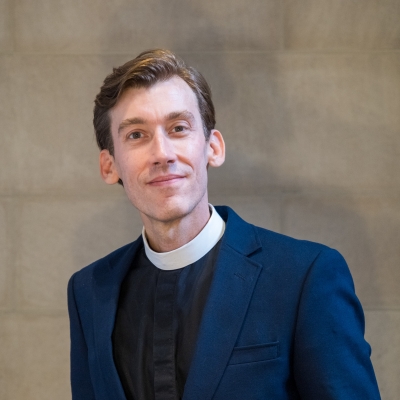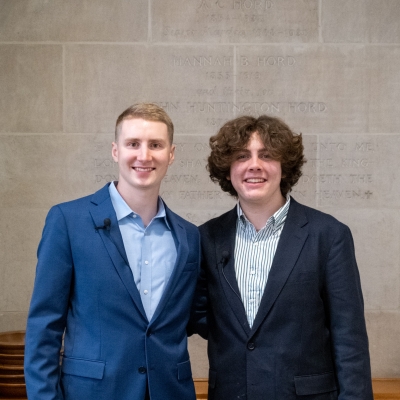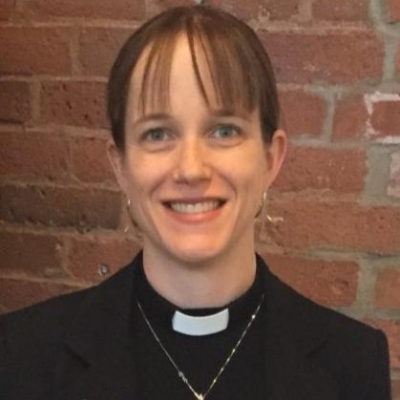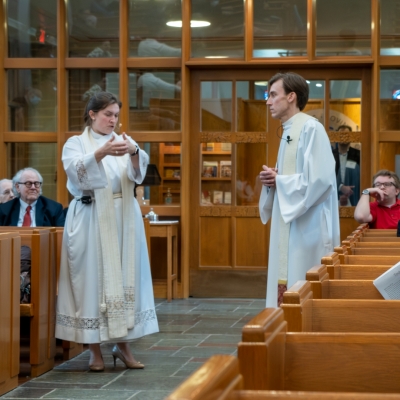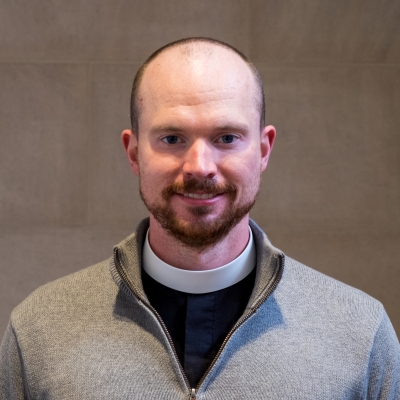Sermons
Words of Sending, Words of Welcome
| Speaker:It’s hard to believe this is the last time I’ll preach to
you as one of your parish priests. As many of you have reflected back to me
over these past few weeks, we knew this day would come when I’d leave, but it’s
still such a hard, bittersweet thing. As my tears have evidenced over the past
few Sundays, I’ve loved you with my whole self over these past five years. The
decision to leave was difficult, and yet I feel a deep sense of call to my new
role on the Bishop’s staff as Canon to the Ordinary.
I was grateful to find a partner in reflection this week
when I turned to the words of Jesus in our Gospel from Matthew today. This is
the third week in row that we’ve been reading from the 10th chapter
of Matthew in what’s known as the “Missionary Discourse.” This chapter includes
Jesus’s sending words to his disciples before they go out to pursue their
ministries and missions.
So, I thought, what better way to honor the end of this
pastoral relationship than to refer to Jesus’s own words of sending? If we review
the Missionary Discourse, we can see that Jesus was creating what some have
called a kind of “Christian handbook.” He called together his disciples and
gave them authority to do the ministry ahead of them: to cast out unclean
spirits and cure diseases. He told them, wherever you go, tell the good news
(10:7), reminding people that the Kingdom of heaven has come near. He told them
to seek out welcome, and if they found a place where they weren’t welcome, to
“shake the dust of their feet” and go on to the next (10:14). “Be wise as
serpents, and innocent as doves” (10:16), he told them. He made sure they knew
that things would get difficult – that relationships would suffer, and they may
face danger, but that it would all be worth it in the end. Your reward will be
great, he told them.
Then we get to the reading for today, which is the end of
his words of sending. Here, Jesus chooses his final words to share with his
disciples before they begin their mission work…and what are they? They are
words of welcome:
“Whoever welcomes you welcomes me, and whoever welcomes me
welcomes the one who sent me.”
In our three-verse reading, Jesus says the word “welcome” 6
times. Welcome, welcome, welcome. As some of you know, one of the main ministry
focuses for me these past five years has been on welcoming and incorporating
newcomers. As I look at you, I see the faces of the many people who’ve joined
this community in recent years. I didn’t really know it when I got here, but
that ministry of welcome became the core of my work here. In the conclusion of
his discourse, Jesus speaks of the rewards of this kind of ministry. As I’ve
shared with some of you, especially some of you who’ve shared in this ministry
with me, welcoming newcomers has been an incredibly rewarding part of my
work and life.
Sitting down with someone, sharing the stories of our faith
and life, welcoming them into this vibrant community, helping them find their
place here in their new spiritual home. It’s been a profound privilege to be a
face of welcome into a church as wonderful as this one.
So, I’m struck that Jesus emphasizes such welcome as the
last bits of wisdom he shares. Now of course welcome looked different in the 1st
century Middle East. Practices of hospitality vary widely by culture and place.
But Jesus reminds us that, no matter what context we exit or enter, welcome is
the first and last thing… Prompting us to reflect on how we welcome, and how
ourselves are welcomed, because Jesus ultimately reminds us that whenever we
welcome each other, we welcome Jesus.
The past few weeks have been full of reflection on what it
has been like and what it’s meant to live in Christian community at St. Paul’s
for these past five years. I’ve reflected on the big things: like the unmatched
glory of Christmas at St. Paul’s. I remember my first Christmas Eve here when
the donkey decided that the moment of his big entrance into the Nave was the
exact moment he needed to go the bathroom. There I saw in the back of the
sanctuary, a crowd of huddled ushers and parents, scooping up donkey poop as we
sang Oh Little Town of Bethlehem.
Or I reflected on the first Sunday after we closed the
building for the covid lockdown. Jeanne and I sat here on these steps and
recorded a video for you all in an empty sanctuary. I remember the fear, the
adrenaline, and how completely unreal it all felt.
Then there were the amazing, transition-marking moments too.
The many, many funerals officiated – the lives of beloved saints celebrated and
laid to rest. The baptisms administered – like the one where the baby slapped
me in the face as I doused her head with holy water. And the weddings too –
especially the incredible opportunity to officiate the wedding of our own
rector Jeanne to her husband Gary.
This building – this community – has held five years
chockful of love, loss, and relationships. It was in this building, right after
staff meeting, that my water broke as I went into labor with our second son. Here,
where dreams of ministry grew, relationships were planted, and lives changed. Big
moments, all of these.
But what strikes me as I reflect on Jesus’s parting words to
his disciples is that he focuses not on the big moments. Instead, it’s the
small gestures that matter: the cup of water that’s offered to one of “the
little ones,” as he calls the disciples in our reading today.
“Whoever gives even a cup of cold water to one of these
little ones in the name of a disciple-- truly I tell you, none of these will
lose their reward,” he says (10:42).
This is the very last thing Jesus says to his disciples
before sending them out to do the “work God gave them to do” in the world. Not
a charge to do great, life, or culture-changing things. But a reminder – a last
word – to take care with their small gestures of kindness and welcome. Be kind
to one another, young and old alike, swift to love. Offer even the smallest
gesture of hospitality to one another: a cup of water to someone who needs it.
I take comfort in this reminder from Jesus, not only as I
reflect on the past, but as I look forward to what’s next for each of us. As we
set out on our separate paths of ministry, we remember the parting words of
Jesus: we begin and we end with welcome. Welcoming each other into community. Allowing
ourselves to be welcomed. Offering kindness to one another, those who fit in
and those who don’t, those who are young and those who are old, those who are
like us and those who are different.
So, as we part ways, I thank you for the welcome you gave
me, and Joe, and Abe and Bax. And I pray that you will continue to welcome
people into the gift of this spiritual community: showing kindness. Offering
hospitality, sometimes in grand fashion, and sometimes in small gestures, like
a cup of water.
For by doing this – by welcoming each other – we welcome
Jesus himself. And we know – because we have already experienced a glimpse of
it together – that our reward will be great. Amen.
Sunday Sermon
| Speaker:“Those who find their life will lose it, and those who lose
their life for my sake will find it.” It is so hard to let go, isn’t it? We are
adept at controlling our lives. We love the security of being in control, of
having the dominion to achieve our wants and desires. Now, Scripture this
morning is telling us to lose our life in order to find it. All that control
that we hold so dear…we are being encouraged to let go. To let go, so we can
trust the path that leads to the fullest life. Let’s look at a few examples to
help us understand control and what it feels like to let go.
I’m going to start with an amusing story about myself –
always good to be able to laugh at our own foibles. For more than 40 years, pregnant
women have relied on the book
What to
Expect When You’re Expecting, which provides both explanation and comfort
around the many facets of pregnancy. I still remember words of advice from this
book. I remember reading about the importance of letting others help after the
baby is born, because, of course, so much time and effort is-needed to take
care of a new, precious life. Specifically, one suggestion the book makes is
letting others load the dishwasher after a meal AND, most importantly, letting
them load the dishwasher the way they choose to load it! Perhaps, some of you
are like me….I do have a certain way of loading the dishwasher – in my mind it
is logical and efficient. I’m guessing my husband, Gary, is smiling as I tell
this story because perhaps he has seen me move around a few dishes after he has
loaded the dishwasher. I really did try to let go in those days following the
births of my sons, but, old habits are hard to break. I know I need to learn to
trust that those dishes will get cleaned just fine however the dishwasher is
loaded.
Another example around control that comes to mind is a great
episode from the tv show
Frasier. I
still watch the reruns of this comedy – a great way for me to relax in the
evening before I go to bed. For those of you who are not familiar,
Frasier is about a psychiatrist, named
Frasier, who has a radio show where people call in for advice. Frasier has a
brother, Niles, who is a psychiatrist, also, but has a private practice. In
this particular episode entitled “Shrink Rap”, Frasier is feeling a desire to
going back to seeing patients, and so Frasier and Niles decide to go into private
practice together. But, their sibling rivalry, which is quite comical, is so
intense that the partnership is a disaster. So, they decide to see a couple’s
therapist. The therapy does not go well. So, the therapist decides to try an
activity to develop trust. One brother is to stand in front of the other and then
fall backwards into his brother’s arms…a tangible example of letting go and
trusting. Niles goes first, but he can’t bring himself to fall backwards. Then,
Frasier tries, but he can’t bring himself to fall backwards, either. The
therapist steps up to demonstrate, hoping he can convince them that they can do
it. But, when the therapist falls backwards, Nile and Frasier are so busy
glaring at each other in anger, neither of them catch the therapist and, so, he
falls to the floor. Ah, but imagine, trusting…letting go…falling back, and being-embraced
by loving arms.
I’d like to offer one more example, a timely example. When I
arrived at St. Paul’s in the fall of 2015, we had an open Assistant Rector
position. In December, I received a resume from a seminarian who would be
graduating in May of 2016. That seminarian was Jessie Dodson. I interviewed her when she was in the area
over her Christmas break and I thought, huh, I may have just hit the jackpot. I
brought her back for a day of interviews with the Search Committee, Vestry and
Staff, we heard her preach, and the decision was unanimous – I was delighted to
make the call and offer her the position. But, she turned me down. WOW. I was
SO disappointed. How to let go? How to let go when you think you have just the
right candidate? Well, what happened? The Rev. Dale Grandfield happened. Dale
interviewed for the position and joined us in May of that year. We enjoyed
three years with Dale. And, in 2018, when the Rev. Rich Israel was retiring,
Jessie was once again, looking for a position, and on the second round, we got
her and have benefitted from and enjoyed her ministry with us for five years. It’s
hard to say good-bye to Jessie. No one will replace her. But, someone new will
come along. We will benefit from a new relationship, while being ever grateful
for the time we had with Jessie.
Do these examples give some insight into the various ways we
control life? Do they help us feel, to experience that letting go – allowing
others to help, allowing others to lead, allowing a new path forward? We love
the security of being in control, of having the dominion to achieve our wants
and desires. We love the security of charting our own path, of controlling our
lives to achieve our own measure of importance, or our own measure of success. But
what do we lose in tightly controlling our lives?
We lose the ability to let God lead. God is-all-knowing. God
knows beyond our wishes and desires. God knows beyond the limits of our sight. When
we let go, and let God lead, we see new ways to love, new perspectives, new
opportunities, new ways to appreciate life and one another. When we let go, we
experience life in its fullness: the immensity, the complexity, the
inclusivity, the possibility, the rightness. Christ came to show us this path
forward. “Those who lose their life for my sake will find it.” We are-meant to
let go, to be dependent on God – that is how we are-created. As a celebrated
preacher writes, “God’s all-encompassing claim on our lives becomes our
comfort” (Lance Pape,
Feasting on the
Word
, Year A, Volume 3, p. 169). Let us let go and know that peace which
surpasses all understanding. Amen.
Sunday Sermon
| Speaker: The Rev. Nancy Hildebrand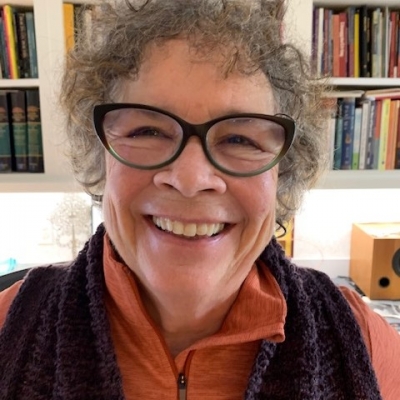
Good morning! Today, we have the honor of recognizing two wonderful occasions: Father’s Day and Juneteenth, which are two unlikely occasions that in their own way represent the possibilities in human relationships. Is it possible to link these two powerful tributes today? In a reflection honoring my father, I realized that the way he raised his daughters by opening the door to the fullness of the world and encouraging us to step across the threshold into what appeared to be empty space was a matter of faith and love and a sign that we would be entering into an accepting society. My prayer for Juneteenth tomorrow is that all African American children will have Fathers confident of opening that door for their children. This hope for the future of children is creational.
I refer you to Genesis1:26, which is the first Creation story. God says: “Then let us make humankind in our image, according to our likeness….and in the summing verse, “So God created humankind in his image, in the image of God, he created them, male and female he created them. Notice, God says, “let us” and “our likeness” when referring to God’s self. Notice that God “created them, “male and female.” Women are made in God’s image. Adam and Eve are equal in the “our-ness of God.” Fathers and mothers, like Adam and Eve, are each made in God’s image. There is no mention of the color of the male and female, nor the type of hair, eye color…just the word humankind, which reflects God’s wonderful plan of diversity among all living things. There’s no mention of defined roles by sex, color, sexuality…just the powerful description of “our” …we are all in this together. Parenting has changed along with many other things. I give thanks for the equality of sex and parenting roles today, even as I know more progress is required.
Old fashioned Dads gave a lot to us kids. I celebrate my dad in a hundred ways, but, most importantly, I love the way, my dad navigated the burgeoning feminist movement, applied those lessons to his relationship with his wife and daughters. He challenged my mom to go to college when I was in high school, and he employed feminism to his daughters in every phase of their development. My dad had a way of opening a door to our futures while pointing to the figuratively big empty space on the other side while saying, “Go on, you can do it, cross over.” He didn’t tell us what to do or how to do it, but just “go forth into the world in joy and in seeing that of God in every person.” I wish every child had a dad do that for them. I wish that the world was more accepting of every child going through that door as I experienced as a young white woman, despite the archaic challenges we face.
My Mom made me a fighter without pugnaciousness. I wasn’t sure what that meant or how that might be used. My dad saw me as accomplished and spiritual. I always thought he and she over-rated me by a long shot. However, it wasn’t long after I crossed the threshold that I understood where my parents’ appraisal and reality began. The blessing of being over-rated is that you have a benchmark for life that becomes not a specific goal, but a way of life. I pray for all children to have Dads who over-rate them and who will have the faith that when they open the door to adulthood, a society will exist who will welcome them all. I pray that all children have a future of their deepest desire and a passion to unite that quest to the “One” to the “our” who created us and abides with us. Lord, let all children have wonderful Dads and a just society where their lives can be fulfilled.
The Genesis creation story is equally applied to the American family. We Americans are a household which is a place of dreams fulfilled and broken. The tragic favoritism of whites over African Americans is still playing the story over again in masked and unmasked forms. Our American family is still very much a dysfunctional family with many tragedies which demand all our efforts to sort out, correct, and heal. I look forward to the day when all Americans are singing America the Beautiful with the gratitude and soulfulness that the largely gay audience sang when the Supreme Court legalized same-sex marriage. Juneteenth is a day for the moment to celebrate the great political achievements of the Emancipation Proclamation, The passing of the 13th Amendment, the achievements of the Civil Rights movement and the progress of integration since then. However, we are reminded daily and painfully that the job is not done. The genius of the Civil Rights Movement was to invite white as allies in the cause. It replicated in human terms the fullness of God, God’s name, “our.” It is time now for whites to ask our black sisters and brothers with humility, with courage, and with eagerness, what is needed of us now, teach us what to do. Help us, Lord, to listen without defensiveness, argumentativeness, and, most importantly, with love.
The number of police killings since 2014 of African Americans added up, aroused fear and anger to new levels, and actually frightened many whites as well. We liberal whites who can face the truth are aghast, but we cannot seem to move. We are frozen like deer in the headlights. We cannot forget the names of those killed by the police and vigilantes because it smacks of the Jim Crow era. We cannot go backward. Let us pray for the fathers of Eric Garner, Michael Brown, Tamir Rice here in Cleveland, Eric Harris, Walter Scott, Freddie Gray, Alton Sterling, Philando Castile, Stephon Clark, Botham Jean, Breonna Taylor, George Floyd, Daunte Wright, and Patrick Lyoya. We are nowhere near the fulfillment of our dreams for a just society for all people. The creation of the world and all the wonders of life, especially with “humankind” and all the animals of the earth, tells us that God’s desire is for a wondrous world filled with a wide variety of beings. Even in the story of the Great Flood and Noah’s Ark, God commanded that representatives of all living things be brought into the Ark so that diversity would be preserved. God’s plan seems to be unity within diversity, with even God self- referring as “Our.” So, we whites need to stop resting in the achievements of the past decades and turn lovingly to our black sisters and brothers and earnestly apologize for our complacency and complicity. We can hope for forgiving for the sins of the generations of the past to the present, but we cannot hope or ask for forgetting. This can only be asked if we do the work to turn towards our black sisters and brothers and ask them what is required of us.
How can we turn this around?
This is the time to say that the Church must take a leading role in helping us to move forward. I highly recommend our Church’s report on repairing the racial breach in church and in the larger society. It is “Realizing Beloved Community, a Report from the House of Bishops Theology Committee.” The report emphatically states that understanding the roots and tentacles of white supremacy is essential for racial progress to occur. Elements of that process includes remorse and confession for the active and substantial role played by Christianity, the Anglican Communion, and The Episcopal Church in constructing, maintaining, defending, and profiting from this monstrous sin and scandal of racism. The report lays out a formal process to address this most pressing of issues. Our church is committing and so should we all. Fathers and Mothers unite in the “our-ness of our God” and lead our children to a new future so all may step through an open door into a society which has open arms. Amen.
